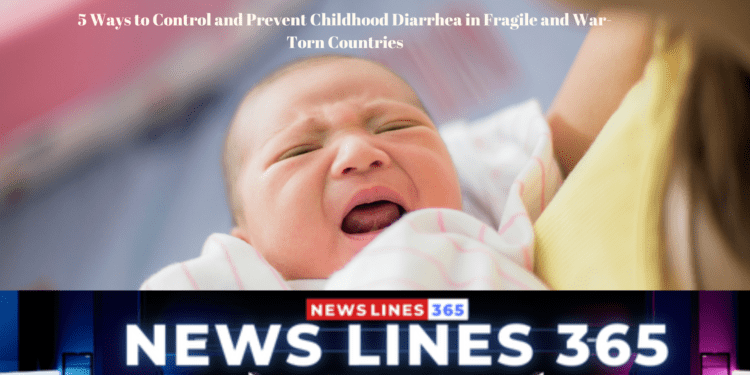In war-torn and fragile countries, childhood mortality rates are much higher than in stable nations. In these countries, it is hard for children to live because of the harsh conditions, lack of education, and constant violence. One of the leading causes of death among children younger than five years old is diarrhea due to contaminated water and food. In fact, over half of all child deaths in these countries are related to diarrheal diseases, making them the number one cause of death in this age group worldwide.
1) Improve Water Quality and access to water
Many communities and refugees living in the camps or temporary settlements in fragile, war-torn countries e.g., Yemen, South Sudan, Libya, and Northwest Syria are often forced to drink water contaminated with parasites, bacteria, or other pathogens. One way of improving the quality of drinking water is
- by boiling it. This kills any microbes that may be present. Boiling water also reduces lead levels.
- The second step is to filter the water through a cloth made of a material such as cotton or wool so that you can remove any sediment or large solid particles.
- The third option is adding chlorine tablets or bleach to kill off any remaining microorganisms and make the water safe for drinking.
- The fourth step is using a high-capacity storage container so that the filtered and boiled water stays clean for longer periods of time.
- The fifth step is to set up a mobile drinking water van that can provide safe and clean drinking water to the people and community living in IDPs or information settlements
Note: Steps 4 and 5 are recommended for UNICEF’s WASH section, which supplies and provides drinking water to camps and informal settlements.
2) Enhance Sanitation Conditions
The World Health Organization (WHO) says that diarrhea affects one billion people annually. That’s one out of every twelve people on earth, or 3.2% of the global population. While viruses or bacteria are the most common causes of diarrhea, they can also be caused by contaminated food, water, or surroundings. In many countries throughout Africa and Asia, unsafe sanitation conditions are a common cause of diarrhea in children under 5 years old due to poor hygiene practices and a lack of access to adequate toilet facilities.
The best way to control and prevent childhood diarrhea is through access to clean water, sanitation, and education on proper hygiene. Here are four ways to help control and prevent childhood diarrhea in fragile and war-torn countries.
- improved sanitary conditions, which include proper sewage disposal systems for human waste as well as
- good practices for handling wastewater from dishwashing, bathing, and laundry.
- Third, invest in infrastructure to improve access to clean water. This can be done by repairing or building new wells and latrines, as well as constructing and maintaining water distribution systems.
- Four, promote sanitation and hygiene education in schools and communities. This can be done through awareness-raising campaigns, training, and the distribution of hygiene kits.
- Improving sanitation facilities and services is crucial to Control and prevent the spread of diarrhea. When families do not have access to clean water or toilets, they are more likely to contract diarrhea.
- Construction and maintenance of community toilets and use of mobile toilets for the IDPs and informal settlement so that when the population moved from location then mobile toilets could also be shifted to the new location.
3) Promote better Hand hygiene
Hand hygiene is one of the best and easiest ways to stop and control diarrhea in children. This can be done by providing soap and clean water at latrines and hand-washing stations, as well as education on proper hand-washing techniques. Also, it’s important to make sure food is cooked and handled in a clean and safe way. This can be done by cooking food thoroughly, avoiding cross-contamination, and washing fruits and vegetables. It is important too;
- Wash hands after using toilets or urinary,
- Wash hands before handling food,
- Wash hands before touching the new-born baby
- Wash hands after coming into contact with someone who is sick, and
- Wash your hands when touching surfaces or unhygienic utensils
- Wash your hands after coming from markets/offices/playgrounds/public places, etc.
4) Encourage breastfeeding during diarrhea
Diarrhea often comes with being dehydrated and not getting enough food, so it’s important to keep breastfeeding while your baby has diarrhea. Breastmilk helps control and prevent dehydration by providing hydration and essential nutrients to infants. Additionally, breastfeeding helps to build immunity in infants and can help control and prevent future episodes of diarrhea.
- Breastmilk helps to Control and Prevent dehydration
- and provides hydration and essential nutrients to infants.
- breastfeeding during diarrhea helps to build up the infant’s immunity to the infection.
- The antibodies in breast milk can help to protect the infant from getting sicker.
Breastfeeding is important during diarrhea because it helps control and prevents dehydration, provides hydration and essential nutrients and boosts the immune system. Additionally, breastfeeding has been shown to reduce the severity and duration of diarrhea episodes.
5) Increase Access to Oral Rehydration Solutions
The World Health Organization (WHO) estimates that nearly 1,600 children die from the diarrheal disease every day, making it the second leading cause of death in children under the age of five. Together, zinc supplements and oral rehydration solution (ORS) make diarrhea less severe and last less long. They can also help control and stop future episodes. Even so, zinc is not often used to treat diarrhea, in part because people don’t have access to the rehydration solution. A study in Nepal showed that, when ORS was made more accessible, there was a significant increase in the use of zinc for treating diarrhea. Increasing access to ORS rehydration solution could help control, prevent, and treat diarrhea, cholera, and other water-borne illnesses that can kill. Despite its benefits, there are many barriers to controlling and Preventing patients from accessing ORS. Lack of knowledge about ORS, local preferences for traditional medicines, and the cost of ORS are some of the reasons for low rates of uptake. Lack of access to safe drinking water is another reason for the low use of ORS, as patients are unable to mix the solution.
In addition to improving health infrastructure and promoting hygiene education, it is also important to provide access to oral rehydration solutions (ORS).
- ORS is a simple and effective treatment for diarrhea that can be used at home.
- It is made by mixing a packet of powder with clean water and can help Control and Prevent dehydration.
- ORS packets are available for purchase at most pharmacies and can be stored at home for emergency use.
- ORS is a solution of sugar and salt that helps replace the fluids and electrolytes lost during diarrhea.
- It is essential to give ORS to children who are dehydrated, as it can help to Control and Prevent death.
- ORS can be mixed with clean water and given to children by mouth.
- It’s recommended that UNICEF or service providers should ensure free and easy access to ORS for all.
- Finally, it is essential to provide oral rehydration solution (ORS) to children with diarrhea.
Thank you for reading!














